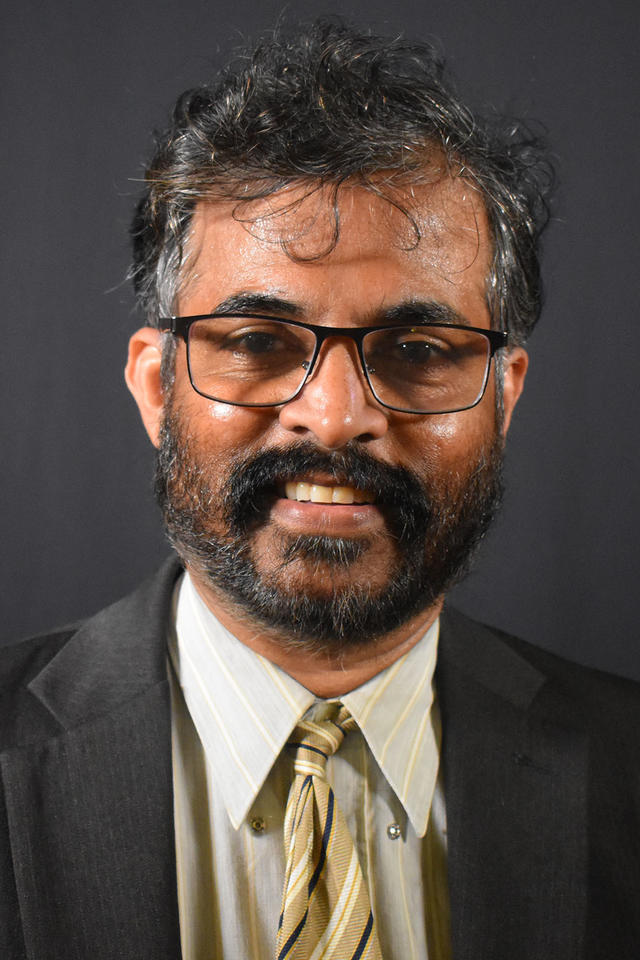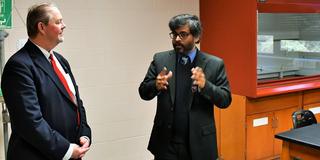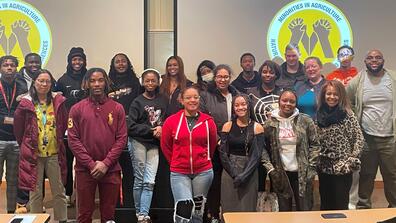
Central State’s Department of Water Resources Management chairperson named fellow by ASCE Board of Direction

Above: U.S. Department of Agriculture Deputy Undersecretary Scott Hutchins (left) and Dr. Ramanitharan Kandiah were spotted in deep discussion at the Air Vibration and Noise Laboratory in the C.J. McLin International Center for Water Resources Management on the campus of Central State University. This meeting of minds is a testament to the ongoing collaboration between our government and academia, working together to address pressing environmental issues. It's inspiring to see such dedicated professionals joining forces to ensure a sustainable future for our planet.
The American Society of Civil Engineers (ASCE) Board of Direction named the Central State University Department of Water Resources Management Chairperson Ramanitharan Kandiah, Ph.D., a fellow this past August. Founded in 1852, the ASCE is the nation’s oldest engineering society and acts as the representative body for civil engineers across the globe.
"Being inducted as a fellow is a recognition given for the work I’ve done for the ASCE," Kandiah, who is also a professor of Environmental Engineering at Central State, where he’s taught for the past 16 years, said. "There are very few fellows, so it gives a lot of visibility for me and for Central State."
Kandiah added that it is only after a civil engineer has worked professionally for 10 years and has focused much of that work on community service that he or she is eligible for the auspicious honor.
In addition to myriad other accolades, recognitions, and professional certifications, Kandiah is one of only 800 people worldwide who has received the prestigious designation of Diplomate, American Water Resources Engineers (D.WRE) Certificate.
A registered professional civil engineer in Ohio, and a Certified Professional Hydrologist (PH), Kandiah serves as the chairperson of the Groundwater Quality Committee of the Environmental and Water Resources Institute, is a member of the Environmental Sustainability Committee of the American Academy of Environmental Engineers and Scientists, a member of the Diversity Equity and Inclusion Committee of the American Institute of Hydrology, a member of the Air Quality and Odor Control Committee of the Water Environment Federation, and is a program evaluator for the Accreditation Board for Engineering and Technology Inc.
His work over the years has been supported by the National Science Foundation, the U.S. Department of Transportation, the U.S. Department of Defense, and the U.S. Department of Agriculture.
Kandiah received the Distinguished Service Award from the Association of Environment Engineering and Science Professors (AEESP) in 2019 and chairs the organization’s Membership and Demographics Committee. He also serves as the University representative for the Association of Environmental Engineering (ASEE).

He is the co-author of "Introduction to Water Resources," which is widely used as a textbook for introductory natural science courses, and co-edited Nova Science Publishers’ 2020 book, "Sustainable Water: Resources, Management, and Challenges."
After receiving his Ph.D. in civil engineering from Tulane University, Kandiah began his postdoctoral work at Northeastern University, where he also taught classes. Kandiah first heard of Central State after a teaching assistant from Beavercreek referred him to the growing lab research taking place at the Institution’s John W. Garland College of Engineering, Science, Technology, and Agriculture (JWGCESTA).
"I hadn’t ever expected to end up here," Kandiah laughed. "But I was going through the different applications at schools where I could teach, Central State popped up, and I did end up coming here. I also ended up living in the town where my teaching assistant was from, Beavercreek!"
Having been on the faculty at Central State for nearly two decades makes Kandiah especially proud that his becoming an ASCE fellow will bring a great deal of enduring spotlight to not only his work here but also his program, classes, and students in his department.
"What we offer here at Central State is a bachelor’s in Water Resources Management, mandated by the state of Ohio in the late 1980s," Kandiah said. "It’s one of only two undergraduate Water Resources Management programs in the entire nation."
By 2008, Kandiah was part of the faculty who helped to expand their department by offering new classes that focus on water policy, water economics, and water law, with instruction encapsulating geographical information systems, air, and noise pollution control, solid and hazardous waste management, and remote sensing.
"When it comes to the water industry, with these new classes," Kandiah elaborated, "if students don’t want to deal with the rigorousness of environmental engineering, they can pursue the path of water technicians or go into water law. Some of our students, for example, now work for the USDA as soil and water conservationists and two others are now working for the EPA."
Kandiah and his department are also now developing a new Environmental Management master’s degree, as well.
His being a long-time member of the ASCE has allowed Kandiah to usher in a variety of substantial partnerships and collaborators to his classes and research hubs. Such vocational connections have led to his developing a valuable workforce program in water resources engineering, drinking water, and water management at Central State. ASCE collaborations have also led to a variety of internship opportunities through Kandiah’s classes and programs.
Kandiah is further enthused by the fact that, in 2020, Marauders made up 15 percent of the 119 Black, Hispanic, and Pacific Islander students who graduated from undergraduate environmental programs throughout the United States and Canada. This made Central State the school graduating the largest number of minority environmental engineering undergraduates for that year.
"We are a small program, but when it comes to graduating minority students from university, we are the ones doing a lot," Kandiah said. "More than that, when you look at the last 10 years, aside from maybe two or three students, all of them are now working in high levels of the water industry or working toward their doctorates."
This smaller size may be contributing to the success of Kandiah’s students, he believes. Due to the intimate, one-on-one connection his fellow faculty members and he forges with those taking their classes, Marauders can gain support that they may not be able to find at larger schools. This includes help in finding resources for financial aid and even, as Kandiah recounted, unique personal touches.
“There was one time when one of my students couldn’t take an important exam in class because he couldn’t reschedule his shift working at a nearby Chinese restaurant,” Kandiah began. “So, I brought the exam to his work, and I was able to give it to him there at the restaurant. That particular student is today managing at Nebraska’s largest wastewater treatment plant.”
Considering concerns over the years faced by the likes of fracking, water hardness, greenhouse gas, and environmental disasters such as the nearby East Palestine train derailment or Canadian wildfires, Kandiah is staunch in his aspiration for continuing to grow and bolster his programs at Central State in order to help ameliorate and diversify the future workforce of the essential water industry field.
“We do have water problems here,” Kandiah said. “And we need people to be able to manage and treat them. If you look into water management facilities right now, they will tell you that they don’t have enough people. They need more people. They need to train more people. That’s why this is such a hot thing. And that’s what we’re doing here. This gives us more value and purpose to do it.”


